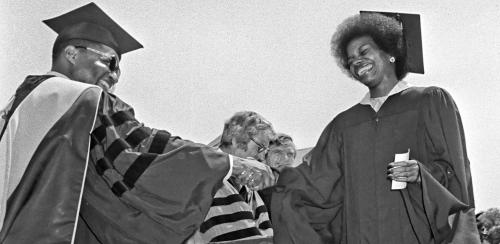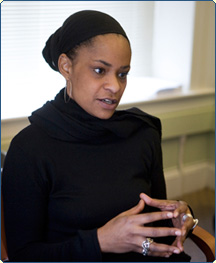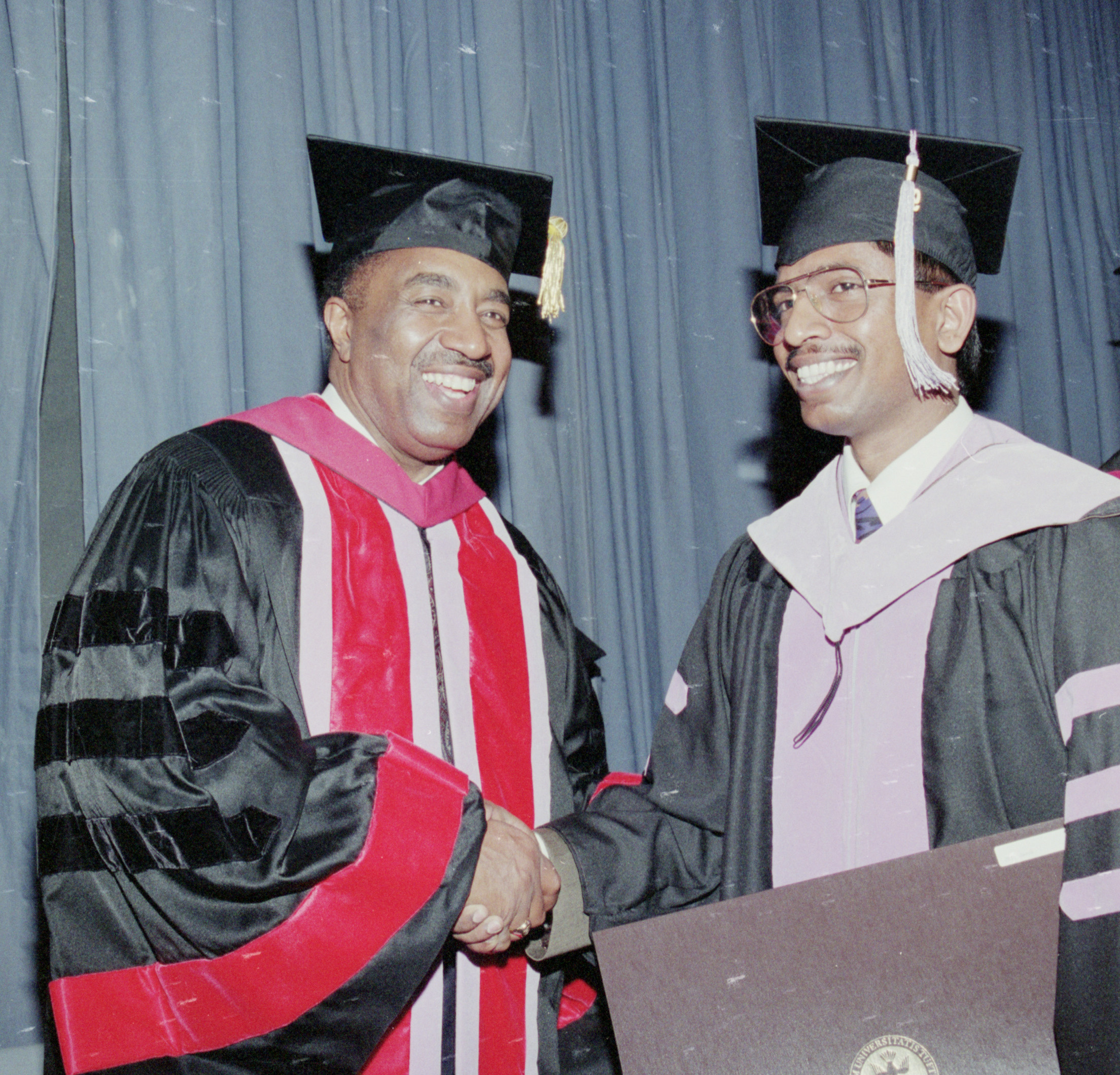
Leading While Black at Tufts: Learning through Archival Research, Deena Bhanarai
There is something very unique about learning about history through archival research. Most of the information I was handling while researching for the Leading While Black symposium was obtained from archival primary sources. Thus, the picture came together not through reading coherent histories about our honorees, but rather through observing photographs of the honorees in action, listening to oral histories and audio cassette recordings, as well as reading their archived meeting minutes and their extensive curricula vitae. In contrast to how it would feel to just read biographies of these honorees, which would feel more like being told a story, archival research allowed me to feel like I was back in the ‘50s, ‘60s, or ‘70s, perhaps sitting in a room with fellow Tufts undergraduates, listening to Dr. Harleston address the university’s current issues at hand with such honesty and humor. It is clear why students and faculty loved him as a person, and why he is an unforgettable member of the Tufts community, with his legacy acknowledged in the renaming of the ‘South’ residence hall to ‘Harleston Hall’ in 2016. The evidence shows for it.
Sometimes, however, on a more sobering note, it was the lack of acknowledgement of some of these leaders’ contributions and voices that spoke equally loud volumes. This research also felt like being there at a meeting with the volunteer focus group for the Task Force on Race, an initiative started by Tufts that concluded in the late ‘90s, collaborated on by various students and faculty of color, including names that many Tufts students of color of today might recognize because of their monumental impacts on Tufts history – names like Jean Wu, Linell Yugawa, Leila Fawaz, Gerald Gill, Todd McFadden, Marilyn Glater, and Bobbie Knable. In spite of the severe absence of representation in that era, Tufts’ people of color have always been present, even if in small numbers, and have always made their voices heard. Despite the fact that I was unable to find much written acknowledgement of the way the Black deans, such as Dean Glater and Dean Knable, contributed – potentially because of the disproportionate amount of speaking and moderating powers given to the somehow all-white group of ‘chairpeople’ of the Task Force on Race – that their role was anything but passive. Anyone who is truly familiar with the history of intersectional people of color in the United States would know that it is the solutions brought to the table by people with the lived experience of being a person of color – especially those of Black and Indigenous leaders – that actually lead to tangible and productive change. Often, these speakers are not credited, and I would not be surprised if this is the case with these more ‘sensitive’ issues that I uncovered through this archival research. This is one way this project has challenged me to look between the lines. Especially after having been an undergraduate at Tufts during the COVID-19 pandemic and observing Tufts’ somewhat tangible, but still in many ways surface-level, responses to the Black Lives Matter movement and demands from Black students and staff, reading the papers on the 1990s Task Force on Race feels almost too relatable. Even if I was not there, I could take an educated guess on how those meetings went, and what happened after. In fact, we do know; in 2020, an equivalent of the Task Force on Race was launched in the form of the ‘Another Tufts is Possible’ movement, with practically the same demands from Black and other people of color in the Tufts community. This information is not to discourage us into thinking that change has not occurred, however, it is a sobering reminder that this work must continue. As Dean Knable expresses in her 1988 speech on ‘Perspectives,’ "it would be really foolish to say nothing has changed. My job here is a result - for one - of those changes.”[1]

Despite the unavoidable issues that were inevitably faced by the Black faculty and students of Tufts’ history, it would be harmful to assume and to focus entirely on struggle. While this project required me to give due respect to each of the honorees’ different individual achievements, personalities, and values, I could not help but notice the patterns and similarities between many of these honorees’ stories. Some of the clearest common themes that run through all of the honorees’ legacies, no matter what era they were at Tufts, are those of restorative justice, optimism and of looking forward, in spite of hardships they endured within Tufts and outside of it. Although all the honorees have, at some time, warned that Tufts has a long way to go in terms of inclusivity, they have all expressed their personal love and respect for Tufts, in particular, regarding the people in the Tufts community who supported them along the way. Perhaps the most touching part of this piece is that for these honorees, the people who inspired them and cheered them on included not only family and friends, but also students and faculty – in particular, their fellow Black leaders of Tufts. In Director Lisa Coleman’s oral history interview, she reflects on how “the reality is that without Bernie, there is no me, literally,” and how “the reasons that I decided to come to Tufts over the other schools, were Bobbie Knable, and Steven Nelson, and Marilyn Glater.”[2] Coleman exemplifies how her predecessors played a huge role in lighting the way, making her job easier, and allowing more people like herself to pursue a same or similar path. On top of that, Coleman also alludes to how even though our featured leaders were of different eras, she feels like they are all connected through a warm sense of community based on mutual respect and understanding. While the Black people of Tufts’ history might not have had strength in numbers, they managed to wield strength from community and shared experiences. And - although this is not to say a meagre amount of representation is enough, as it is not - for many Tufts students and faculty of color, having even one leader of color to look up to is better than none at all.

It is this exactly that demonstrates the real reasons why Black representation in leadership matters in institutions like Tufts and why we are spotlighting the honorees in question, and also points to what we can take away from this symposium. This is not for Tufts to make into a publicity stunt, nor a showcase that puts the leaders on a pedestal, because doing so and putting unwarranted emphasis on only what these Black leaders have done for Tufts can lead to the harmful assumption that these leaders are only valuable because of what they have done for Tufts. This symposium is, however, an opportunity for us to recognize the long-existing sense of community, collaboration, and camaraderie that having Black faces in positions of influence creates. Although these leaders were undeniably essential members of the wider community and made connections with many people regardless of race or other intersectional identities, having someone who is of your identity – especially if that identity is marginalized – offers an unmatchable sense of relief, and empowers you to feel like you can move in the space with someone walking alongside you. As Marilyn Glater expresses while fondly remembering her close circle of fellow Black women faculty who called themselves the ‘Soul Sisters,’ she notes that the things they talked about at their gatherings “had nothing to with work...but helped [them] deal with the many things [they] had to deal with.”[3]
To reiterate, true appreciation for the honorees is not just celebrating the outcomes of their efforts through their academic and professional accolades; it is appreciating them as humans as well, and appreciating their joy and life stories. Nothing will take away from the fact that in 1982, Dr. Vivian Pinn became the third woman, and first Black woman at that, in the USA to become the Chair of any Pathology Department, or that in 1990, Dr. Lonnie Norris became the first Black tenured professor at Tufts Dental School. It is still important to remember that in 2012, President David Harris became Tufts’ first African-American Provost, and that during her time, President Joanne Berger-Sweeney championed some of Tufts’ most successful initiatives for diversity and inclusion such as the launching of the BLAST program and the founding of the Race, Colonialism, and Diaspora program. And this project will highlight all of these achievements; however, that will not be all that we highlight. As Dr. Norris mentions while reflecting on getting hired, “nobody really...asked, ‘How well are you doing now? You survived, but...based on your Blackness...is anybody being racist against you?’"[4] It would not do their stories justice to just acknowledge what they have achieved without acknowledging the honorees’ unique journeys, and more importantly, letting the evidence speak for itself as much as possible and trying to show as much of the story as I can.

There is no denying that being a leader, Black or not, takes an extreme level of resilience, compromise, and strength; this is the case to the extent that often, many do not check up on the wellbeing of these leaders, because they are often expected to be resilient, make compromises, and be strong for everyone else. In the posts to come, that will be featured on the Tufts DCA website and socials over the course of Black History/Legacy Month and the rest of the Spring 2022 semester, the DCA aims to promote an awareness of the lesser-known aspects of these honorees’ careers, lives, and values, and what we can learn from their stories. We invite you to think critically and read between the lines when scrutinizing the resources provided, and take away your own informed opinions from the information available, regardless of what our own narratives are, and take a moment to consider how Black leadership fits within the realm of Tufts, and higher education in general. We also challenge you to read books and journals by Black authors, listen to oral histories, and observe a diverse range of resources about Black leadership, Black history, and other related matters, not just during this Black History Month, but also beyond. In particular, we encourage you to pay attention to not only the difficult aspects of history, but also to celebrate with us Black joy and success; as Lisa Coleman emphasizes in a discussion of how she learnt to embrace Black joy rather than just viewing history through a ‘deficit model’ when talking about Black history, “I started thinking...’how do you infuse [Black joy]?’...part of this is about the expansion of how we think about things. That expansion isn't just for Black people. That's for everyone, so...we think about the expansive nature of how we imagine communities, how we imagine each other, and how then we interact with each other across time and space, particularly at a learning institution.”[5] If we at Tufts truly want to move towards being an inclusive, antiracist, uplifting space for education and enrichment for all, these things feel important to value and keep in mind as we do the work.
____________________________________________________________________________________
[1] Historical Materials Collection. Perspectives, given by Bobbie Knable, 1988-09-19. Cassette tape labeled ‘Perspectives’ featuring a recording of Bobbie Knable’s talk at a showing of the film, ‘Eyes on the Prize’. UA136.004.027.00036. Tufts University. Digital Collections and Archives. Medford, MA.
[2] Lisa Coleman, ‘Leading While Black’ Tufts Oral History, interviewed by Alonso Nichols (2021; Medford, MA: Tufts University, 2021), audio recording.
[3] Marilyn Glater, ‘Leading While Black’ Tufts Oral History, interviewed by Alonso Nichols (2021; Medford, MA: Tufts University, 2021), audio recording.
[4] Lonnie Norris, ‘Leading While Black’ Tufts Oral History, interviewed by Alonso Nichols (2021; Medford, MA: Tufts University, 2021), audio recording.
[5] Lisa Coleman, ‘Leading While Black’ Tufts Oral History, interviewed by Alonso Nichols (2021; Medford, MA: Tufts University, 2021), audio recording.







